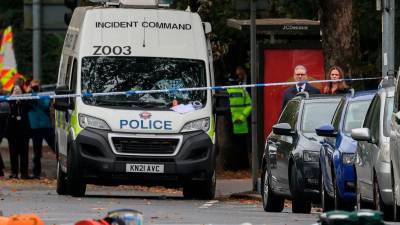MANCHESTER: British police said on Friday they may have accidentally shot two victims, including one who died, in their attempts to bring under control an attack on a Manchester synagogue during Yom Kippur, the holiest day in the Jewish calendar.
In Thursday’s attack two men, Adrian Daulby, 53, and Melvin Cravitz, 66, were killed after a British man of Syrian descent drove a car into pedestrians and then began stabbing several people outside Manchester’s Heaton Park Hebrew Congregation Synagogue.
The attacker, whom armed officers shot dead at the scene, was not carrying a firearm, said Greater Manchester Police chief constable Steve Watson, though one of those killed suffered a gunshot wound.
“It follows therefore this injury may have been sustained as a tragic and unforeseen consequence of the urgently required action taken by my officers to bring this vicious attack to an end”, Watson said in a statement.
UK vows to crack down on Antisemitism
Watson said another worshipper is believed to have suffered a non life-threatening gunshot wound, and that it is thought both victims were close together behind the synagogue door, as worshippers tried to prevent the attacker from gaining entry.
Police have named the attacker as Jihad al-Shamie, 35, and said they could find no records to show he had been referred to the government’s anti-radicalisation programme.
The British government vowed to redouble its efforts to tackle antisemitism as the Jewish community reeled from the attack.
On Friday, Prime Minister Keir Starmer visited the site of the attack and spoke with members of the Jewish community. He did not make any public statements, but said earlier that al-Shamie wanted to “attack Jews because they are Jews”.
Police also urged organisers of a planned protest in London this weekend in support of a banned pro-Palestinian group to cancel or postpone the event, saying it would divert police resources needed to protect fearful communities.
Organisers said the protest, the latest in a series in which police have arrested more than 1,500 people, would go ahead, and that it was the police’s choice whether to make more arrests of people “peacefully holding signs”.
Like other European countries and the United States, Britain has recorded a sharp rise in antisemitic incidents in the nearly two years since the war in Gaza started.
Israel has accused Britain of allowing rampant antisemitism to spread through its cities and universities, and repeated that criticism after Thursday’s attack.
Starmer last month announced that Britain was recognising a Palestinian state, a decision that was criticised by Israel as a “huge reward to terrorism”.
Britain’s interior minister, Shabana Mahmood, criticised pro-Palestinian protests that took place hours after the Manchester attack, calling them un-British and dishonourable and urging people to show a bit more “humanity and some love towards a community that is grieving”.
Antisemitic incidents, jewish community’s concerns
The killing shocked Britain’s Jews, particularly in Manchester, home to the country’s largest Jewish community outside London and a highly diverse city.
Many Jewish leaders noted that they were the only faith in Britain that routinely required security at its institutions.
Last year was the second worst on record for antisemitic incidents in Britain, surpassed only by 2023, according to the Community Security Trust, which provides security to Jewish organisations across Britain. It recorded more than 3,500 incidents last year.
Islamophobic incidents in Britain have also increased since the start of the Gaza war.
On Friday morning there was a heavy police presence at the scene of the attack, with debris still lying in the street and bunches of flowers being left nearby.
Dawud Taj, a 28-year-old from Manchester, said the government should have done a better job at protecting people.
“There’s an atmosphere in the air,“ he told Reuters as he walked to the city centre, “and everything feels a little bit shaky” – REUTERS
